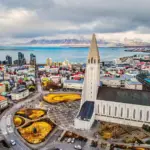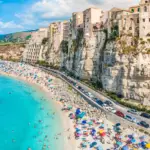
But what is the best time to go to GreeceIf you are planning a trip to Greece, it is important to choose the right time to visit this enchanting country. Although it is possible to visit Greece year-round, each season brings its own characteristics, and it is important to consider your interests and preferences when planning your trip. In this sectionLet's explore the best time to visit Greece and provide essential tips for planning your trip.
Main Conclusions:
- Choose the best time to visit Greece according to your interests and preferences.
- Consider the climate and the different stations in Greece when planning your trip.
- Keep in mind that high season in Greece Plan ahead to avoid crowds and high prices.
- If you prefer milder weather and fewer tourists, try visiting Greece during the off-season months.
- Enjoy the beaches, cultural festivals, and tourist attractions. historical and beauties natural from Greece at each time of year.
Climate and Seasons in Greece
To make the most of your trip to Greece, it's important to understand how the climate and seasons affect the country. Greece has a Mediterranean climate, with mild winters and hot, dry summers. However, the temperature and climate differences between Greek regions can be significant.
Seasons in Greece
Greece has four distinct seasons:
- Spring: From March to May, spring is a pleasant time to visit Greece, with mild temperatures and nature in full bloom.
- Summer: From June to August, summer is the high season in GreeceWith warm temperatures and many tourists, it's the best time to visit the Greek beaches and participate in cultural events.
- Fall: From September to November, autumn is a pleasant time to visit Greece, with moderate temperatures and fewer tourists than in summer.
- Winter: From December to February, winter in Greece is moderately cold, with some mountain areas receiving snow. Some Aegean islands close during the winter.
Best time to visit the beach in Greece
The best time to enjoy Greek beaches is during the summer, from June to August. Temperatures are high and there are many sunny days, making it ideal for swimming and enjoying the sea. However, this is also the busiest period on the beaches and in tourist towns.
If you prefer to avoid the crowds, spring and autumn are also good times to visit the Greek beaches. Temperatures are a little lower, but still pleasant, and the beaches are less crowded.
High season in Greece
THE high season in Greece It occurs mainly during the summer months, from June to August. During this period, the country receives a large number of tourists, causing the attractions and beaches to become more crowded.
You busiest months in Greece July and August are the peak months. During these months, many beaches become crowded, and accommodation and transportation prices can be higher. However, there are also many entertainment options and cultural festivals happening during these months, making them a popular choice for travelers.
If you plan to visit Greece during peak season, it's important to book hotels and transportation in advance, and be aware that tourist attractions may be more crowded. To avoid crowds and make the most of your trip, consider visiting the most popular attractions very early in the morning or late in the day.
High season in Greece is a busy but also very lively time. Even with the increased number of tourists, you'll be enchanted by the country's beauty and have a lot of fun during your trip.
Low season in Greece: When to visit to avoid the crowds
Although Greece is beautiful year-round, visiting during peak season can mean dealing with crowds, higher prices, and difficulties booking accommodations and tourist attractions. Fortunately, the Low season in Greece It also offers many advantages.
Less busy months in Greece
THE Low season in Greece It begins in mid-September and ends in May, excluding the main holidays in December and January.
Between September and November, many islands and tourist destinations They close for the winter, but major cities like Athens are still open for visits and offer a unique and authentic atmosphere. Winter in Greece can be cold, with average temperatures ranging from 8°C to 15°C, but it's a great opportunity to explore the sights without having to deal with large crowds.
From March to May, spring in Greece brings an explosion of colors and wildflowers, and the weather is milder, with temperatures ranging from 12°C to 20°C. Starting in April, many islands and tourist destinations reopen, and crowds gradually begin to increase.
Advantages of visiting Greece during the off-season.
There are many advantages to visiting Greece during the off-season, including:
- Fewer tourists, allowing you to explore the sights more calmly and without queues;
- Lower prices on accommodations, flights, and tourist activities, allowing you to save money;
- Better service in restaurants and hotels, since these places are not overwhelmed by the number of tourists;
- Opportunities to learn more about local culturesince you can have more interactions with local residents outside of the peak tourist season;
- Carnival Festival in Patras, one of the biggest carnival festivals in Europe, which takes place in February.
Disadvantages of visiting Greece in the off-season
While there are many advantages to visiting Greece during the off-season, there are also some disadvantages, such as:
- Some islands and tourist destinations close completely during the low season;
- Fewer transportation options;
- Some tourist activities may be closed or have limited operating hours;
- The weather may be unstable, with more frequent rain and colder temperatures.
Known for its beautiful beaches, warm weather, and sunny days, Greece is a very popular tourist destination in Europe, famous for its rich culture and ancient history. Regardless of the time of year you choose to visit, Greece has much to offer, and you're sure to have a wonderful time. unforgettable experience.
Festivals and Events in Greece
Greece is a country incredibly rich in culture and history, and this is reflected in its calendar of events throughout the year. During your trip, it's worth checking out some of the country's main festivals and cultural celebrations.
Festival of Athens and Epidaurus
The Athens and Epidaurus Festival is one of the most important cultural events in Greece. Held in July and August, the festival presents a wide range of classical theatre performances, dance and music in historical locations.
Patras Carnival
The Carnival of Patras is one of the biggest carnival festivals in Europe. It takes place in February and is known for its extravagant parades, lively parties, and plenty of food and drink.
Thessaloniki Music Festival
The Thessaloniki Music Festival is an annual event held in September. It features a wide variety of music, from classical to jazz and rock. The festival is a great place to discover new artists and enjoy high-quality music.

Crete Food and Wine Festival
The Crete Food and Wine Festival is an annual event held in June. It showcases the local cuisine and wines of the island of Crete and is a perfect opportunity to sample some of the country's most authentic dishes.
Kalamata Dance Festival
For dance lovers, the Kalamata Dance Festival is a must-see event. Held in July, the festival features a wide variety of contemporary and classical dances, as well as workshops for dancers of all levels.
The festivals and cultural events of Greece offer a unique opportunity to immerse yourself in the rich culture of Greece. history and the country's traditions, as well as enjoying authentic music, dance, and food.
In addition to these events, there are many other festivals and cultural celebrations that take place throughout the year in Greece. Be sure to check the local schedule during your trip and don't miss the chance to experience the... vibrant culture and diverse in the country.
Exploring the History and Culture of Greece
Greece is a A popular tourist destination known for its fascinating ancient history. and its rich culture. When visiting the country, it is important to see some of the most well-known tourist attractions and learn about its history and... Greek culture.

Tourist Attractions
The Acropolis of Athens is one of the most iconic sites in Greece, with ruins of ancient temples such as the Parthenon. Another popular site is Delphi, which was considered the center of the world in ancient Greece. There, you can visit the Temple of Apollo and the Delphi Stadium.
The city of Thessaloniki has a rich Byzantine and Ottoman history and culture, with sites such as the Rotunda of Galerius and the Arch of Galerius. On Mount Athos, you can visit medieval monasteries and admire Byzantine art.
Greek Culture
THE Greek culture It is rich in mythology, poetry, theater, and philosophy. It is possible to see performances of classical Greek theater in places like the Ancient Theater of Epidaurus and the Theater of Dionysus in Athens.
Greek cuisine is another important aspect of the country's culture, with dishes such as moussaka, souvlaki, and tzatziki. It's possible to participate in cooking classes and wine tastings in places like the island of Santorini.
History of Greece
THE history of Greece Ancient Greece dates back more than 5,000 years, with the Minoan civilization in Crete and the subsequent rise of Greek civilization. The classical era of Greece was marked by events such as the Persian Wars and the golden age of Athens led by Pericles.
THE history of Greece It also includes Byzantine rule, Roman rule, the Ottoman Empire, and Greek independence in the 19th century. You can learn more about Greek history at museums such as the Acropolis Museum in Athens and the Archaeological Museum of Thessaloniki.
Beaches and Summer Activities in Greece
Greece is a prime summer destination, with its idyllic beaches, picturesque islands, and warm, sunny weather. If you're planning a trip to enjoy the Greek summer, here are some beaches and activities you can't miss.

Beaches in Greece
Greece has a wide variety of beaches, from secluded coves to extensive stretches of sand. Some of the most popular beaches include:
| Beach | Location | Comments |
|---|---|---|
| Navagio | Zakynthos | One of the most photographed beaches in the world, with a shipwreck on the shore. |
| Ballos | Crete | A beach with crystal-clear water and stunning views over Gramvousa Island. |
| Myrtos | Cephalonia | An award-winning beach with turquoise waters and a dramatic mountain backdrop. |
For a more tranquil experience, consider visiting more secluded beaches, such as Elafonissi Beach in Crete or Agios Prokopios Beach in Naxos.

Summer Activities in Greece
Besides its beaches, Greece offers a variety of summer activities to suit all tastes. Here are a few options:
- Cruises through the Greek islands
- Surfing and windsurfing on the island of Paros
- Diving in the crystal-clear waters of Santorini
- Kayaking tours around the Peloponnese Peninsula
- Musical and cultural events in Athens or on the island of Mykonos.
Regardless of what you choose, the summer activities in Greece They will certainly keep him busy and entertained.

Landscapes and Nature in Greece
Greece is a country blessed by nature, with stunning landscapes ...and natural beauties that enchant visitors from all over the world. Throughout the Greek territory, it is possible to find everything from paradisiacal beaches to imposing mountains, passing by lakes and rivers of crystal-clear water.
Greek Islands
The Greek islands are one of the country's main attractions, with their crystal-clear beaches and incredible landscapes. The most famous islands are Santorini, Mykonos, Crete, and Rhodes, but there are many other islands with equally stunning scenery. Be sure to explore the Greek islands during your trip.
Mountains of Greece
Greece is also famous for its mountains, which offer spectacular views and trails for adventurers. Mount Olympus is a highlight, standing at 2,917 meters high and historically significant as the home of the Greek gods. Other famous mountains include Mount Parnassus, Mount Taygetus, and Mount Pelion.
National Parks
Greece has several national parks that are home to some of the country's most incredible natural landscapes. National park Mount Olympus is one of the most popular, with its dense forests, rivers, and waterfalls. National park Vikos-Aoos, in the north of the country, is another highlight, with its deep gorges and unspoiled nature.
Lakes and Rivers
The lakes and rivers of Greece are also an attraction for visitors seeking nature. Lake Plastiras, with its blue waters and surrounded by mountains, is one of the most famous. The Voidomatis River is another highlight, with its crystal-clear waters and historical importance as the cradle of Greek civilization.
Conclusion
Greece is an incredible destination for those who love nature and breathtaking landscapes. Be sure to explore all the natural riches the country has to offer during your trip, whether on the coast, in the mountains, in the national parks, or in the lakes and rivers. beauties natural from Greece They will certainly surprise and delight you.
Final recommendations for your trip to Greece.
Before embarking on your trip to Greece, it's important to make some preparations to ensure your... Have a smooth trip. and pleasant. Check out our below. travel tips for Greece:
- Documentation: Please ensure your documents are up to date, including your passport and visa (if applicable).
- vaccineNote: Consult a doctor to find out if you need to get any vaccinations before traveling.
- Travel insurance: Purchase travel insurance to protect yourself in case of unforeseen events during your trip.
- Accommodation: Book your accommodation in advance, especially if you are traveling during peak season.
- Transport: Research the transportation options available in Greece and choose the one that best suits your itinerary. Consider renting a car or using public transport.
- Baggage: Check your airline's baggage restrictions and avoid taking too many bags.
- Money: Bring euros in cash and check how the exchange rate works in Greece.
- Climate: Check the weather forecast for the time you will be traveling and pack appropriate clothing for the weather conditions.
- Agenda: Plan your itinerary in advance and include enough time to visit the main tourist attractions.
Following these travel tips for GreeceYour trip is sure to be a success! Make the most of everything this enchanting country has to offer.

Conclusion
In this sectionThat concludes our guide on the best time to visit Greece. We hope the information presented has been helpful in planning your trip and enjoying everything the country has to offer.
Remember to consider the weather and seasons when deciding when to visit, as well as the advantages and disadvantages of each period. Regardless of the time you choose, you're sure to be captivated by the rich history. culture and natural beauty from Greece.
Be sure to explore the beaches and summer activities, participate in festivals and cultural events, and visit the iconic landmarks that tell the story of the country.
Finally, remember to make the necessary preparations for your trip, including what to pack and how to get around the country. With planning and care, you can make the most of everything Greece has to offer.
FAQ
What is the best time to go to Greece?
The best time to visit Greece is during spring (April to June) and autumn (September to October). The weather is pleasant, not as hot as in summer, and it's a great time to explore the country's landscapes and tourist attractions.
What is the weather like in Greece throughout the year?
THE climate in Greece Weather varies throughout the seasons. In summer (June to August), temperatures are high, making it the perfect time to enjoy the beaches. Winter (December to February) can be cold, but there are still sunny days. Spring and autumn are milder seasons.
What are the peak season months in Greece?
The peak season months in Greece are July and August, when many tourists visit the country. During this period, beaches and tourist attractions can be more crowded, and prices tend to be higher. It is important to book in advance during these months.
What are the low season months in Greece?
The months of Low season in Greece The holiday season runs from November to March, except during Christmas and New Year's. This is a great time to enjoy lower prices, fewer tourists, and a more authentic experience of the destination.
What festivals and events take place in Greece?
Greece is known for its festivals and cultural events. Some of the most famous are the Festival of Athens and Epidaurus, held during the summer, and the Carnival of Patras, which takes place between January and February. These celebrations offer an experience unique culture Greek.
What are the main historical and cultural tourist attractions in Greece?
Greece is home to many important historical and cultural sites, such as the Acropolis of Athens, the Temple of Olympian Zeus, the ruins of Delphi, and the Palace of Knossos in Crete. These sites allow visitors to explore the rich history and culture of Greece.
What are the best beaches and summer activities in Greece?
Greece boasts a multitude of stunning beaches, such as Navagio in ZakynthosElafonisi in Crete and Porto Katsiki in Lefkada. Besides enjoying the beaches, you can enjoy activities such as diving, boat trips and water sports during the summer in Greece.
What is the natural landscape of Greece like?
The landscape The natural beauty of Greece is diverse and enchanting.You'll find towering mountains like Mount Olympus, stunning golden sandy beaches like those in Mykonos, and volcanic islands like Santorini. The time of year can influence the colors and... natural beauties of the country.
What are your final recommendations for my trip to Greece?
Some final recommendations for your A trip to Greece should include bringing sunscreen. And insect repellent, wear comfortable shoes to explore the sights, plan your itinerary in advance to make the most of your stay, and respect local traditions and customs.
Lucas Wanderlust has a tireless spirit of adventure, always seeking new travel experiences. Fascinated by the world and the possibility of exploring unknown destinations, he fell in love with the sense of freedom and self-discovery that traveling alone provides. With a backpack on his back and a heart open to the unknown, Lucas embarks on exciting journeys, where each destination becomes a unique chapter in his life story. He gives himself body and soul to the magic of solo travel, inspiring others to follow in his footsteps and discover themselves through adventure.







